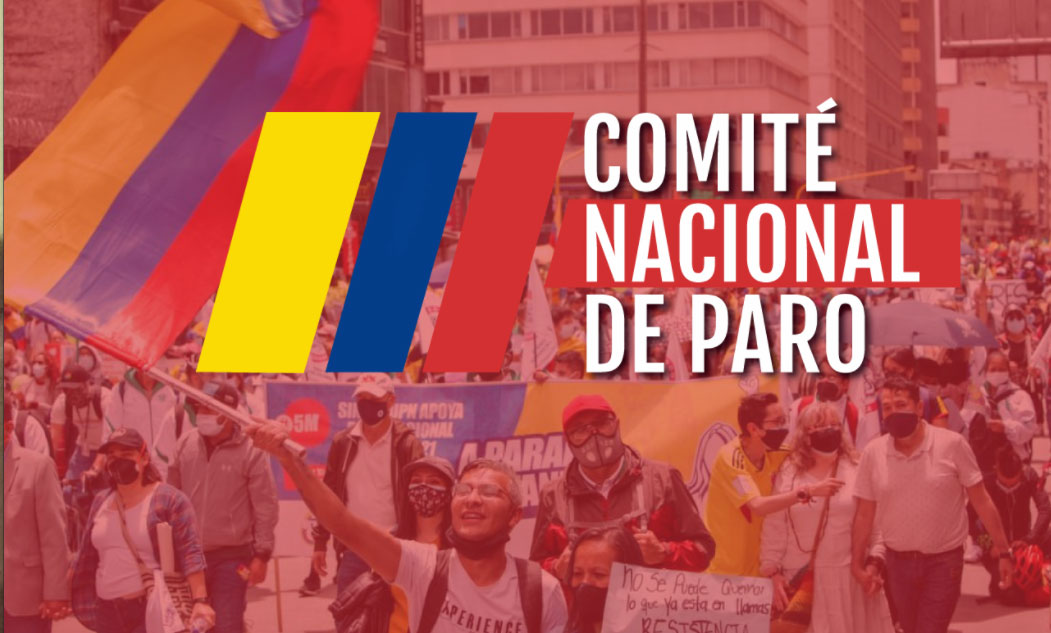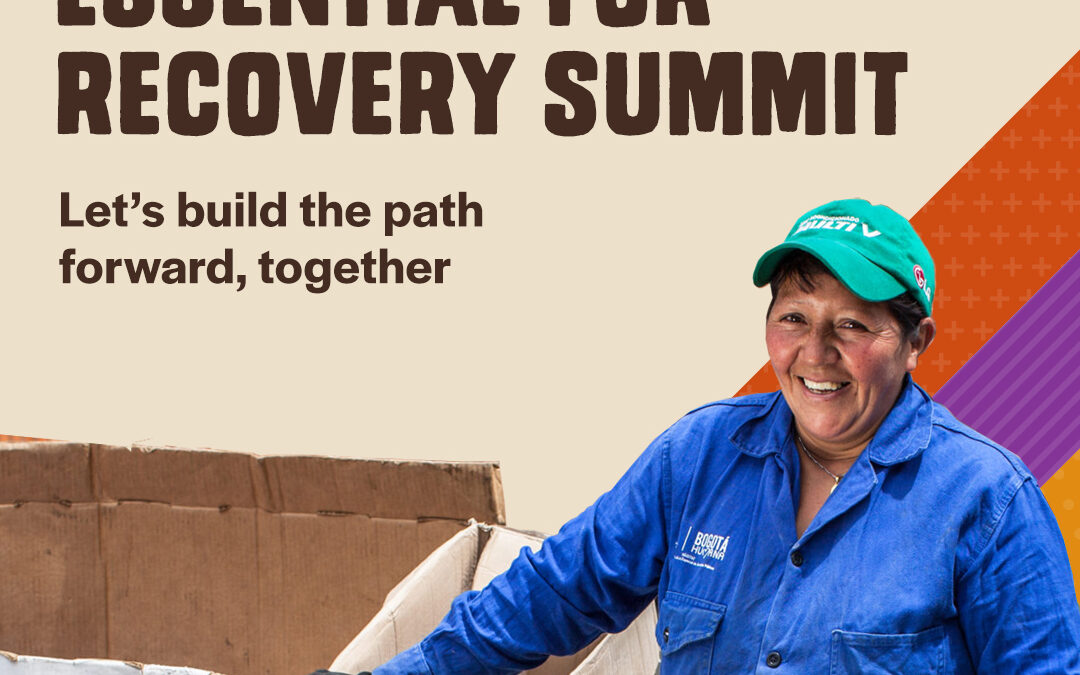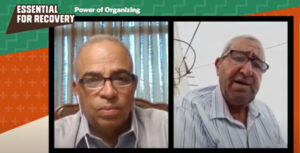
Sep 15, 2021
When hundreds of thousands of Colombians took to the streets for weeks last spring to protest the government’s move to give wealthy corporations and rich individuals huge tax breaks while raising taxes on working people, workers and their unions were at the forefront.
Despite the state’s brutal response, in which violence—including illegal detention, torture and the use of lethal weapons—was directed against workers, women and Black and Indigenous communities, the National Strike Committee, a broad coalition of rural workers, the LGBTQ community, environmentalists, women’s organizations and young people, won big victories, says Francisco Maltés.
Maltés, president of the Unitary Workers Center (CUT), the largest union confederation in Colombia, speaks with Solidarity Center Executive Director Shawna Bader-Blau in a special episode of The Solidarity Center Podcast.
“We were able to do away with the worst tax reform proposal that had ever been seen in Colombia,” says Maltés, describing one of the movement’s gains. Just as important, he says, is that for “the first time in the history of social struggles in Colombia,” unions and their allies can define an agenda and help shape public conversation.
“We are now able to talk about basic income, free tuition, wage subsidies for small and medium businesses. Issues that matter to workers and the average people in Colombia.”
Listen to this and all Solidarity Center episodes here or at iTunes, Spotify, Amazon, Stitcher, Castbox or wherever you subscribe to your podcasts.
Stay Tuned for Season Two!
The Solidarity Center Podcast, “Billions of Us, One Just Future,” highlights conversations with workers (and other smart people) worldwide shaping the workplace for the better.
We will back in a few weeks with Season Two, so be sure to join us for a new episode each Wednesday!
Meantime, listen to our special summer episode with union leader Phyo Sandar Soe who speaks from a safe house in military-controlled Myanmar to share how workers have risked their lives on the frontlines for democracy since the February 1 coup.
Also: Check out the full first season of The Solidarity Center Podcast.
This podcast was made possible by the Ford Foundation and the generous support of the American people through the U.S. Agency for International Development (USAID) under Cooperative Agreement No.AID-OAA-L-16-00001 and the opinions expressed herein are those of the participant(s) and do not necessarily reflect the views of USAID/USG.

Sep 14, 2021
Workers who risked their health to provide essential services during the pandemic joined with actors, global union leaders and policymakers in a first-of-its-kind worldwide gathering to share their experiences and demand a response that urgently and effectively protects all people, and especially the most marginalized.

Yalitza Aparicio spoke in support of government action to ensure essential workers have decent wages and safe work.
“COVID-19 has taught us about the importance of workers in all sectors and recognize that they deserve dignified work and they are important in the world economy,” said actor Yalitza Aparicio. “Governments know about this. But, what are they doing about it?” Aparicio was among dozens of speakers during the September 8–10 Essential For Recovery virtual summit who pointed to the need for action to ensure decent wages, rights and social protections like paid sick leave so workers deemed “essential” during the pandemic will not be left behind after the crisis passes.
As the Summit made clear, essential workers often work in the informal economy. “They have no rights, no minimum wages, no rule of law, no social protection,” said Sharan Burrow, general secretary of the International Trade Union Confederation (ITUC). “We have to get a minimum living wage to all essential workers. We have to afford them collective bargaining rights. And we have to put in place universal social protection in safe workplaces.”
Organized by the Open Society Foundations and hosted by actor Sophia Bush, Essential For Recovery focused on four themes: increased income and improved working conditions; healthy and safe workplaces and access to health care; social protection benefits and support for vulnerable workers; and ending gender-based violence and harassment at work.
The Solidarity Center co-sponsored the event, along with HomeNet International, ITUC, StreetNet International Alliance of Street Vendors, UNI Global union and WIEGO.
Catch the full three one-hour sessions:
Unions, Collective Action Key to Building Back Better

Mithqal Zinati (right), a coordinator for Jordan’s agricultural sector, says workers need the right to form unions to ensure safe workplaces.
In Jordan, where workers have limited rights to form unions, Mithqal Zinati, a coordinator for the country’s agricultural sector, says the government’s action “keeps thousands and tens of thousands of workers from being part of providing solutions to the problems facing the agriculture sector. This eliminates the role of workers to defend their rights and protect their interests and to see beneficial gains.
“For everyone, having a union is very beneficial. For farmers and for workers at the same time.”
As the pandemic highlighted, workers with unions often more readily had access to personal protective equipment (PPE) and decent wages. Summit participants discussed the power of grassroots organizing to improve workers’ lives, and described how, over the last year, essential workers in the formal and informal economies went on strike to win access to PPE and vaccines. They took to the streets and to social media to demand more democratic societies and governments.
Maria do Carmo, a Brazilian street vendor, organized street vendors into a nationwide organization, the National Union of Hawkers, Street and Market Vendor Workers of Brazil (UNICAB), and through their collective power, raised awareness of their issues with politicians. “Today we have respect from City Hall,” she said.
“Over the past two days, we’ve seen proof of the effectiveness of collective action, and of the importance of eliminating gender inequities. But at the heart of it all is power,” said Bush, at the start of the third and final session.
Women Targets of Gender-Based Violence, Burdened with Carework
The pandemic also forced many to work from home where women disproportionately engaged in care work. Globally, women lost $800 billion in income due to COVID-19.
Mercedes D’Alessandro, the first national director of Economy, Equality and Gender in Argentina, described a study in which she found that during the pandemic, three-quarters of women did unpaid care work, amounting to 22 percent of GDP—up from 16 percent of GDP before COVID-19.
“The truth is that the increase in time that women dedicate to care activities means also a smaller opportunity to go out and look for a job, continue with their jobs, develop their careers or study, graduate from university,” she said.

Shirley Pryce, president of the Jamaica Household Workers Union, urges governments to ratify a treaty ending gender-based violence at work.
Women also experienced high levels of violence during lockdowns, further highlighting the need for governments to ratify an International Labor Organization (ILO) treaty (Convention 190) to end gender-based violence at work.
“Violence and harassment can happen anywhere, and it can happen to anyone,” said Shirley Pryce, president of the Jamaica Household Workers Union. “But this must not be tolerated. It must stop. Let us push together for governments to ratify this very important convention.”
C190 covers wherever work is performed, such as where workers take a rest break or meal or use sanitary, washing or changing facilities, and includes commuting to and from work.
“We are seeing a new normal. Home has become a workplace,” said Rose Omamo, general secretary of the Amalgamated Union of Kenya Metal Workers, a Solidarity Center partner. Employers must ensure workers have what they need to work from home, including safe workplaces, she said.
Building to a Better, More Equitable Tomorrow

Artists like Sinkane performed during the Essential Worker Summit.
Omamo was in conversation with Rosa Pavanelli, general secretary of Public Services International. The summit provided opportunities for shared discussion, “lightening rounds” featuring workers telling their stories and urging action, and videos showcasing worker issues such as the Tunisian General Labor Union (UGTT)’s documentary on women agricultural workers seeking safer transportation.
Essential for Recovery also featured multimedia presentations by performance artists such as Khansa, a singer, songwriter and dancer from Lebanon; U.S. actor Martin Sheen; Sonam Kalra of the Sufi Gospel Project; and Ahmed Abdullahi Gallab Sinkane, a Sudanese-American musician.
“I stand with all essential workers around the globe. The domestic and agricultural workers, waste pickers, street vendors, caregivers and home-based workers who make our world run,” said Sinkane, before performing U’Huh.
“During the pandemic, we saw how essential they really are. They deserve a living wage, proper employment conditions and a safe and healthy workplace,” he said. “Let’s build forward to a better, more equitable tomorrow.”
Key participants in Essential For Recovery also included Christy Hoffman, UNI Global Union general secretary; Maina Kiai, former United Nations Special Rapporteur on the rights to freedom of peaceful assembly and of association; Guy Ryder, ILO director general and Ai-jen Poo, National Domestic Workers Alliance executive director.






